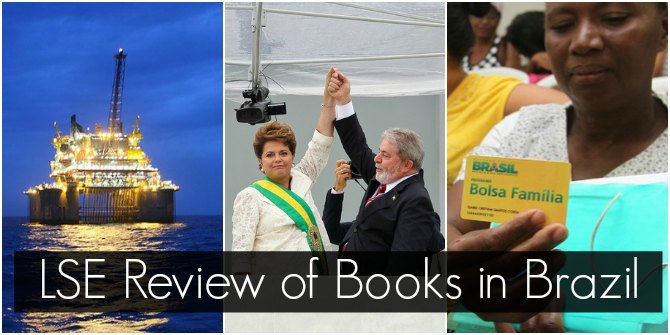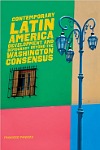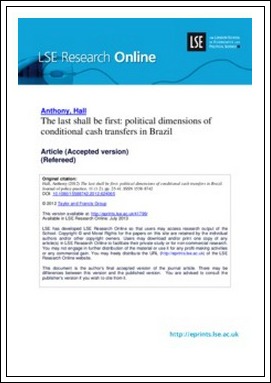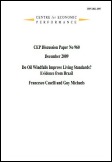
LSE Review of Books Podcast in Brazil: Episode 3: Politics, People and Petroleum
In this episode, we head inland to the heart of the country’s political life: the capital of Brasília. Authors from the LSE including Francisco Panizza (Senior Lecturer in Latin American Politics), Anthony Hall (Professor of Social Policy), Guy Michaels (Associate Professor of Economics) and Francesco Casselli (Norman Sosnow Professor of Economics), talk to LSE Review of Books about left-of-centre politics and social development in the country. We also find out whether Brazil proves or disproves the “oil curse” theory.
Other guests: André Vitor Singer (Former Press Secretary for the Lula presidency), Armando Simões (Ministry of Social Development and Fight Against Hunger in Brasilia), Antonio Claret Campos Filho (Secretary of State of Social Assistance and Human Rights: Rio de Janeiro State), Marcos Mendes (Legislative Consultant, Brazilian Senate), Fernando Postali and Marislei Nishijima (Department of Economics, University of São Paulo).
Reading list:
Os Sentidos Do Lulismo: Reforma Gradual e Pacto Conservador (The Meanings of Lulismo: Gradual Reform and a Conservative Pact) by André Vitor Singer
 André Vitor Singer explores the social and idealogical roots of “Lulismo”, his term for the unique political style of Brazil’s most popular president: Luiz Inacio Lula da Silva, known simply as “Lula”. Lula mixed politics from opposite ends of the political spectrum in a way never seen before in the country.
André Vitor Singer explores the social and idealogical roots of “Lulismo”, his term for the unique political style of Brazil’s most popular president: Luiz Inacio Lula da Silva, known simply as “Lula”. Lula mixed politics from opposite ends of the political spectrum in a way never seen before in the country.
 Contemporary Latin America: Development and Democracy beyond the Washington Consensus by Francisco Panizza
Contemporary Latin America: Development and Democracy beyond the Washington Consensus by Francisco Panizza
In an overview of the history of the region over the past twenty-five years, this book traces the intellectual and political origins of the Washington Consensus, assesses its impact on democracy and economic development and discusses whether the emergence of a variety of left-wing governments in the region represents a clear break with the politics and policies of the Washington Consensus.
 “The last shall be first: political dimensions of conditional cash transfers in Brazil” by Anthony Hall
“The last shall be first: political dimensions of conditional cash transfers in Brazil” by Anthony Hall
Early evidence suggests that Brazil’s Bolsa Família (‘Family Stipend’) program, which currently benefits over 12 million poor families, has alleviated absolute poverty. Although hailed by many as an unqualified success, its political dimensions have been largely ignored or underplayed. These include, for example, the unashamed use of Bolsa Família for electoral purposes, the spread of clientelism and patronage, and the growing dependence of Brazil’s poor on income transfers rather than productive employment. Furthermore, there are indications that the popularity of Bolsa Família is encouraging short-termism in social policy.
Find this journal article: LSE Research Online
 Do Oil Windfalls Improve Living Standards? Evidence from Brazil by Francesco Caselli and Guy Michaels
Do Oil Windfalls Improve Living Standards? Evidence from Brazil by Francesco Caselli and Guy Michaels
Should communities that discover oil in their subsoil or off their coast rejoice or mourn? Should citizens be thrilled or worried when their governments receive fiscal windfalls? To provide systematic empirical evidence on some of these issues, Caselli and Michaels study the effects on an offshore oil-induced fiscal windfall among Brazilian municipalities.
Find this journal article: LSE Research Online
 Inequality, Democracy and Growth in Brazil: A country at the crossroads of economic development by Marcos José Mendes (Upcoming: December 2014)
Inequality, Democracy and Growth in Brazil: A country at the crossroads of economic development by Marcos José Mendes (Upcoming: December 2014)
Marcos José Mendes describes the ways democracy and inequality produce low growth in the short and medium terms. In the longer term, he argues Brazil must create the conditions necessary to boost economic performance and to drive the country toward a high level of development. If it fails, however, to unravel the political knot that blocks growth, it will remain a middle-income country. Português title: Por que o Brasil cresce pouco? Desigualdade, democracia e baixo crescimento no país do futuro.





